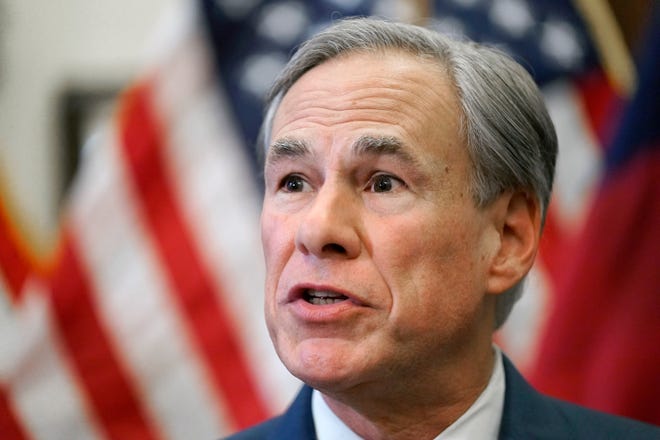
A Texas law went into effect this month that bans abortions at six weeks with no exceptions for rape and incest, making it one of the most restrictive abortion laws in the country. When a reporter Tuesday asked Texas Gov. Greg Abbott how the law will impact rape and incest survivors, he said he intends to “eliminate rape” in his state.
“Rape is a crime, and Texas will work tirelessly to make sure we eliminate all rapists from the streets of Texas by aggressively going out and arresting them and prosecuting them and getting them off the streets," he said Tuesday. "So goal No. 1 in the state of Texas is to eliminate rape so that no woman, no person, will be a victim of rape."
Sexual violence experts say Abbott's approach is fundamentally flawed. When leaders suggest it's possible to end sexual assault by capturing or containing all the rapists, they fail to comprehend the ubiquity of rape and the powerful cultural forces shaping a society that minimizes sexual violence, excuses perpetrators and blames victims.
Fear and shame prevent most rape survivors from reporting their assaults to police, which makes identifying perpetrators a challenge. And often those perpetrators are not lurking on "the streets" – they're in women's homes and workplaces, in their doctors' offices and college dorms.
Most victims of sexual violence know their perpetrators and many of them are men who are loved and even revered. Nearly 40% of rapes are committed by an acquaintance and 33% are committed by a former spouse, according to the Rape Abuse and Incest National Network (RAINN). Less than a fifth of rapes are committed by a stranger.
"Sexual assault is the most underreported violent crime and the people who are committing rape and sexual assault are people the victim knows and trusts," said Laura Palumbo, communications director at the National Sexual Violence Resource Center. "We have numerous cases of doctors, coaches, teachers, officials committing sexual assault. The idea that these people are out on the streets waiting to be captured is very inaccurate."
The majority of rapes and sexual assault are unreported
Nearly 80 percent of rapes and sexual assaults are unreported, according to a 2016 Justice Department analysis.
Abbott's approach assumes women are comfortable reporting (they aren't) that they trust law enforcement (they don't), and that the legal system is equipped to deliver justice (it isn't).
Women who do report often delay because rape is traumatizing, destabilizing and because victims abused by people they know are often left grappling with whether their experience was a violation in the first place.
According to RAINN, survivors' reasons for not reporting include:
- Fear of retaliation
- Belief the police would not do anything to help
- Belief the police could not do anything to help
- Belief it was not important enough to report
- Reluctance to get the perpetrator in trouble
"Most often what victims want is for the behavior to stop and for others to not be at risk for the abuse that they faced," Palumbo said. "A lot of survivors don't think that's a realistic outcome of making a report to law enforcement and pursuing the case through the criminal justice system."
The vast majority of sexual perpetrators escape prison time. Out of every 1,000 rapes, 995 perpetrators will never be incarcerated, according to an analysis of Department of Justice and Federal Bureau of Investigation data conducted by RAINN.
What we know about sex offenders
There is no typical profile of a sex offender, the non-profit Futures Without Violence wrote in 2013.
Analysis:The problem with thinking 'good guys' don't cross the line
"One of our psychological defenses against feeling vulnerable ourselves is to create this idea that it must take some kind of monster to commit sexual assault or any of these other types of sexual offenses," said Sherry Hamby, a University of the South psychology professor and founding editor of the American Psychological Association journal Psychology of Violence.

Abbott's characterization fails to account for accusations against a president, a Supreme Court justice, a Hollywood producer, a comedian, an Olympic doctor. It fails to acknowledge that men who abuse women count on the silence of those around them, and those men exist everywhere.
Analysis:The men who kept Harvey Weinstein's secrets safe are all around us
Trauma upon trauma for rape victims
Rose Luna, chief executive officer at the Texas Association Against Sexual Assault, said the Texas abortion law adds another layer of trauma for survivors still reeling from their assaults.
"We believe survivors deserve dignity, privacy and bodily autonomy across the board, and while we work to prevent sexual assault, Texans and everyone else must face the reality of rape," she said. "Any restriction on a survivor's right to choose is unacceptable."
Rape and incest:They account for hardly any abortions. So why are they a focus?
Luna said organizations fighting sexual violence want to eliminate rape. But they recognize it is more complex than plucking rapists off the streets.
"There are varying ideas on how to get there, but the elimination of it requires a monumental paradigm shift, and a coordination of ideals," she said. "It's going to require a holistic approach that examines the intervention points and how survivors are treated, as well as, on the other side of the coin, analyzing the conditions in society that allow these assaults to occur over and over with no accountability."
Source link









